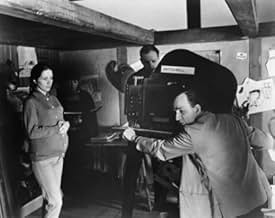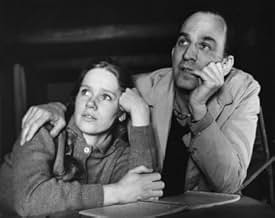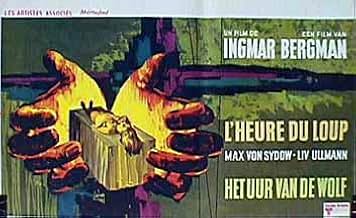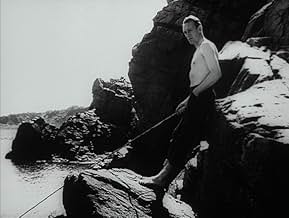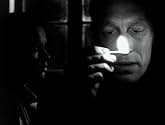CALIFICACIÓN DE IMDb
7.5/10
24 k
TU CALIFICACIÓN
Un artista que pasa sus vacaciones en una remota isla escandinava junto a su joven esposa embarazada sufre una crisis emocional al tratar de enfrentarse a sus deseos reprimidos.Un artista que pasa sus vacaciones en una remota isla escandinava junto a su joven esposa embarazada sufre una crisis emocional al tratar de enfrentarse a sus deseos reprimidos.Un artista que pasa sus vacaciones en una remota isla escandinava junto a su joven esposa embarazada sufre una crisis emocional al tratar de enfrentarse a sus deseos reprimidos.
- Dirección
- Guionista
- Elenco
- Premios
- 2 premios ganados en total
Agda Helin
- von Merken's Maid
- (sin créditos)
Lenn Hjortzberg
- Kreisler
- (sin créditos)
Mikael Rundquist
- Boy in Dream
- (sin créditos)
Folke Sundquist
- Tamino
- (sin créditos)
- Dirección
- Guionista
- Todo el elenco y el equipo
- Producción, taquilla y más en IMDbPro
Opiniones destacadas
The painter Johan Borg (Max von Sydow) and his wife Alma Borg (Liv Ullmann) have been married for seven years and are living in an island. Johan is haunted by nightmares of his past. Through his notes in his diary, his wife realizes his madness process. In the end, after living with him for such a long period, she questions her sanity and what is real.
This impressive and disturbing movie about the lost of sanity by a tormented artist is another magnificent work of Ingmar Bergman, again with his favorite actor (Max von Sydow) and actress (Liv Ullmann). A very Gothic and dark horror movie, it is a frightening view of the mind of a mad person. My vote is eight.
Title (Brazil): 'A Hora do Lobo' ('The Hour of the Wolf')
This impressive and disturbing movie about the lost of sanity by a tormented artist is another magnificent work of Ingmar Bergman, again with his favorite actor (Max von Sydow) and actress (Liv Ullmann). A very Gothic and dark horror movie, it is a frightening view of the mind of a mad person. My vote is eight.
Title (Brazil): 'A Hora do Lobo' ('The Hour of the Wolf')
It's not that scary or disturbing. From some of the comments here on IMDb I was expecting quite a tough film to sit through. It isn't exactly cheery, but I did crack the occasional smile at Bergman's homage to various Horror films. It is as beautifully lit and framed as Persona, and if you like Liv Ullman, and/or Max Von Sydow, you'll want to see this for their very good performances. It is sometimes "Lynch" like, sometimes "Fellini" like, but not nearly as disturbing as say Mulholland Drive. See it if you're a Bergman fan, or if you like movies with a surreal sense. I bought the DVD on Bergman's reputation (I've seen about 25 of his pictures, and loved, around 20 of them). I was not disappointed in the least.
Johan can't escape from traumas past, he's tormented, harrowed, provoked and harassed, his mind is playing tricks, it tortures, taunts, afflicts, leaves him confused, muddled, perplexed and aghast.
A surreal overflowing meltdown, full of symbolism, abstraction and confusion, as the artist Johan Borg struggles to cope with the visions and apparitions that haunt his disturbed being. Max von Sydow and Liv Ullman once again present us with characters from the imagination of Ingmar Bergman that exist in an alien world, or at least one most of us are quite unfamiliar with (thank goodness), in a piece of cinema, like so many others from the director, that need revisiting whenever you get the chance, if for no other reason than to see what you missed previously.
A surreal overflowing meltdown, full of symbolism, abstraction and confusion, as the artist Johan Borg struggles to cope with the visions and apparitions that haunt his disturbed being. Max von Sydow and Liv Ullman once again present us with characters from the imagination of Ingmar Bergman that exist in an alien world, or at least one most of us are quite unfamiliar with (thank goodness), in a piece of cinema, like so many others from the director, that need revisiting whenever you get the chance, if for no other reason than to see what you missed previously.
I can't agree with most of the comments above, and particularly find myself taking the completely opposing view to Adrian Ekdahl. While HOUR OF THE WOLF seems eminently worth viewing (what Bergman film isn't?), I think it's substantially less compelling and essential than SHAME, made the same year with the same two principal players.
It took me a long time to see VARGTIMMEN, and I've finally seen it tonight on the big screen. But while I feel it's an essential enough part of the overall Bergman canon, I'd have to place it squarely in the b-list as far as its coherence and overall effectiveness.
While it contains an unusual level of creepiness by Bergman standards (and a complete journey into surrealism, brief as it is, in the final reel that seems very un-Bergmanesque -- he loves his symbolic images, but rarely has he gone this ambiguously surreal route), the truth seems to be that many many directors have achieved more with this kind of film than this film does. Bergman seems a bit out of his element here. Because most of his films utilize his trademark techniques in the service of a subtle, finely-observed, provocative examination of some difficult aspect of human existence, VARGTIMMEN seems to lose its coherence quite a bit in pursuit of something which is admittedly unusual for Bergman.
Ultimately it seems to examine three themes: 1) Can we, if haunted by things that become inarticulable, go mad from them? 2) Can we, if we love or are attuned enough to those we love, share their demons with them? 3) Schizophrenia. (This appears to me to be what Johan Borg seems to be suffering from).
These are interesting themes, to be sure. But Bergman doesn't seem to really go very deeply into them. Instead, he's kind of skimming the surface (uncharacteristic for him) while enjoying (if that can be the right word) the ambiguity of our knowledge of what's going on. Strangely, while I rarely find Bergman emptily pretentious or needlessly arty (which he is obviously occasionally accused of), this film brought me as close to feeling that way as anything I've ever seen of his. Perhaps it's because he wasn't truly at home in these themes of supernatural/horror, etc. This film actually seems DERIVATIVE of better films, like a Franju's EYES WITHOUT A FACE or even DEAD OF NIGHT. Rarely does Bergman suffer in comparison with other filmmakers who came before him. SHAME (again, made that same year, virtually right after this film), is by contrast a deeply troubling, finely wrought examination of far more (to me) compelling, complex, essential and provocative human issues. I would return again and again to SHAME, but I feel no real need to see HOUR OF THE WOLF again.
It belongs in the canon, yes, and should be seen. But while it is a bit unusual visually, I think it winds up seeming rather minor thematically in the overall pantheon of his work.
It took me a long time to see VARGTIMMEN, and I've finally seen it tonight on the big screen. But while I feel it's an essential enough part of the overall Bergman canon, I'd have to place it squarely in the b-list as far as its coherence and overall effectiveness.
While it contains an unusual level of creepiness by Bergman standards (and a complete journey into surrealism, brief as it is, in the final reel that seems very un-Bergmanesque -- he loves his symbolic images, but rarely has he gone this ambiguously surreal route), the truth seems to be that many many directors have achieved more with this kind of film than this film does. Bergman seems a bit out of his element here. Because most of his films utilize his trademark techniques in the service of a subtle, finely-observed, provocative examination of some difficult aspect of human existence, VARGTIMMEN seems to lose its coherence quite a bit in pursuit of something which is admittedly unusual for Bergman.
Ultimately it seems to examine three themes: 1) Can we, if haunted by things that become inarticulable, go mad from them? 2) Can we, if we love or are attuned enough to those we love, share their demons with them? 3) Schizophrenia. (This appears to me to be what Johan Borg seems to be suffering from).
These are interesting themes, to be sure. But Bergman doesn't seem to really go very deeply into them. Instead, he's kind of skimming the surface (uncharacteristic for him) while enjoying (if that can be the right word) the ambiguity of our knowledge of what's going on. Strangely, while I rarely find Bergman emptily pretentious or needlessly arty (which he is obviously occasionally accused of), this film brought me as close to feeling that way as anything I've ever seen of his. Perhaps it's because he wasn't truly at home in these themes of supernatural/horror, etc. This film actually seems DERIVATIVE of better films, like a Franju's EYES WITHOUT A FACE or even DEAD OF NIGHT. Rarely does Bergman suffer in comparison with other filmmakers who came before him. SHAME (again, made that same year, virtually right after this film), is by contrast a deeply troubling, finely wrought examination of far more (to me) compelling, complex, essential and provocative human issues. I would return again and again to SHAME, but I feel no real need to see HOUR OF THE WOLF again.
It belongs in the canon, yes, and should be seen. But while it is a bit unusual visually, I think it winds up seeming rather minor thematically in the overall pantheon of his work.
10neil-313
This seems to be one that divides fans of the master, but I loved it. It's easy to see why people see this as being a bit of an odd-one-out in Bergman's output: it's very direct in it's depiction of disturbed states of mind, directly illustrating hallucinatory states rather than just hinting at them. Others have pointed to references to other films of the horror genre, which seem undeniable.
Not that you'd mistake this for a film by anyone but Bergman. It's rich in connections with other of his films and autobiographical references (such as the terrifying description of being locked in a cupboard as a child). It can be reasonably thought of as Bergman's 'horror film' but he takes on the genre very much on his own terms.
It's a film that lingers long in the mind, with many unforgettable scenes (including the amazing Magic Flute scene) aided by Sven Nykvist's wonderful chiaroscuro photography. The use of music is (as ever with Bergman, the most musical of directors) extremely intelligent: the scene with the boy is set apart from the rest as much by the music as the photography.
Given the quality of the cast, you'd expect superb performances. As ever, von Sydow and Ullmann are excellent, with equally good supporting performances.
At times I was reminded of Rilke's only novel, The Notebook of Malte Laurids Brigge. If you don't know this, I urge you to seek out a copy: there's a distinctly Bergmanesque atmosphere to the whole work, but there are specific images that seem to link to this film.
This is a film that repays repeated viewings. Despite it's extremely disturbing subject matter, to me it's not as emotionally draining as many of Bergman's other films (such as Shame or Winter Light), in spite of (or perhaps because of) the visual horrors on display. Still, I recommend it very highly.
Not that you'd mistake this for a film by anyone but Bergman. It's rich in connections with other of his films and autobiographical references (such as the terrifying description of being locked in a cupboard as a child). It can be reasonably thought of as Bergman's 'horror film' but he takes on the genre very much on his own terms.
It's a film that lingers long in the mind, with many unforgettable scenes (including the amazing Magic Flute scene) aided by Sven Nykvist's wonderful chiaroscuro photography. The use of music is (as ever with Bergman, the most musical of directors) extremely intelligent: the scene with the boy is set apart from the rest as much by the music as the photography.
Given the quality of the cast, you'd expect superb performances. As ever, von Sydow and Ullmann are excellent, with equally good supporting performances.
At times I was reminded of Rilke's only novel, The Notebook of Malte Laurids Brigge. If you don't know this, I urge you to seek out a copy: there's a distinctly Bergmanesque atmosphere to the whole work, but there are specific images that seem to link to this film.
This is a film that repays repeated viewings. Despite it's extremely disturbing subject matter, to me it's not as emotionally draining as many of Bergman's other films (such as Shame or Winter Light), in spite of (or perhaps because of) the visual horrors on display. Still, I recommend it very highly.
¿Sabías que…?
- TriviaBergman defines "The Hour of the Wolf" as "The time between midnight and dawn when most people die, when sleep is deepest, when nightmares are most palatable. It is the hour when the sleepless are pursued by their sharpest anxieties, when ghosts and demons hold sway. The hour of the wolf is also the hour when most children are born." According to "Films in Review" critic Henry Hart in the U.S. it's about 4 a.m. when the body's resistance is least.
- Versiones alternativasThere exists an earlier version of the film with an additional, meta-cinematic framing device. In the prologue (lasting about 7 minutes), Bergman is seen on the set directing his actors. The epilogue (lasting about 1 minute) shows us the set being torn down and the crew leaving. These sequences are the only differences to the commonly seen version. Bergman has stated in an interview that he cut off these sequences himself before the general release of the film, as he came to the conclusion that they were just "self-deception". Despite this, a Swedish 35 mm print of the original, longer version does exist, although it's not available on home video in any format.
- ConexionesEdited into 365 days, also known as a Year (2019)
Selecciones populares
Inicia sesión para calificar y agrega a la lista de videos para obtener recomendaciones personalizadas
- How long is Hour of the Wolf?Con tecnología de Alexa
Detalles
- Tiempo de ejecución1 hora 28 minutos
- Color
- Mezcla de sonido
- Relación de aspecto
- 1.37 : 1
Contribuir a esta página
Sugiere una edición o agrega el contenido que falta

Principales brechas de datos
By what name was La hora del lobo (1968) officially released in India in English?
Responda

